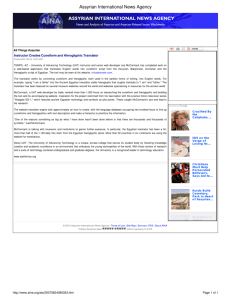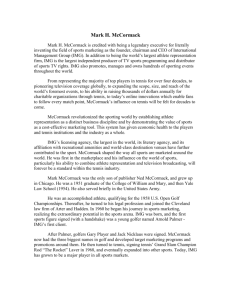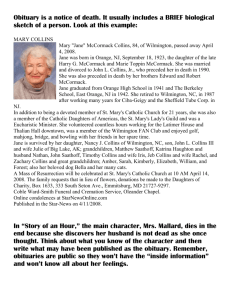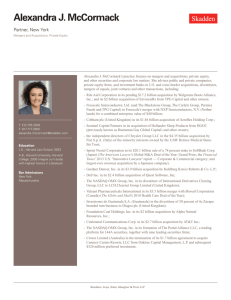E-Update 4 - November 2010
advertisement
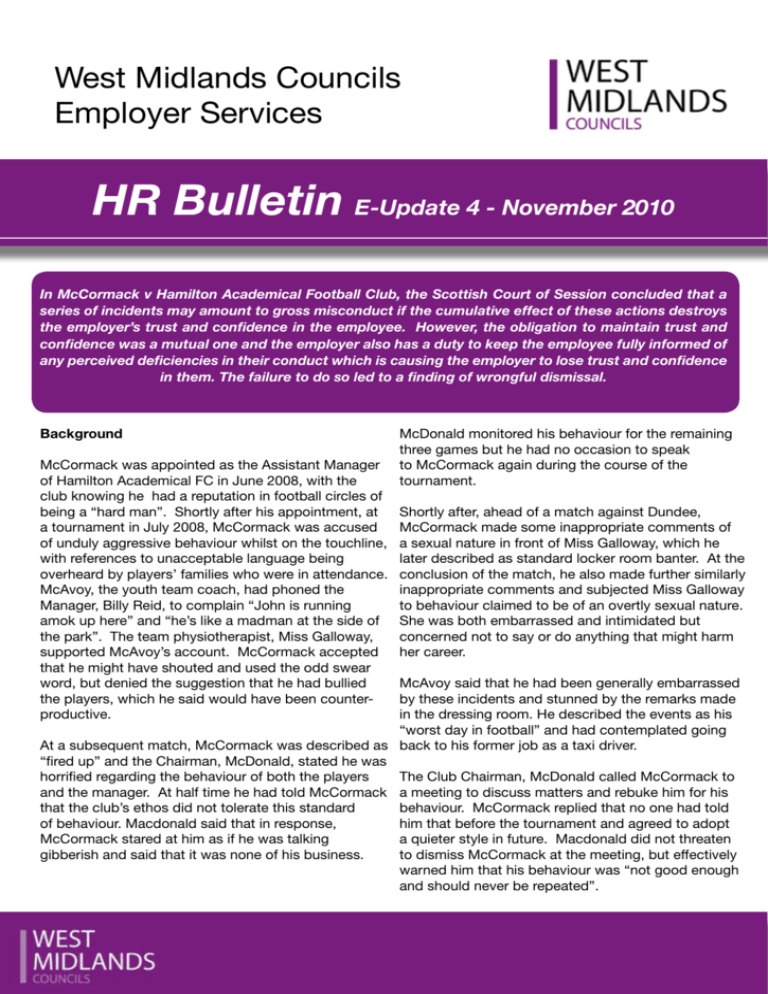
West Midlands Councils Employer Services HR Bulletin E-Update 4 - November 2010 In McCormack v Hamilton Academical Football Club, the Scottish Court of Session concluded that a series of incidents may amount to gross misconduct if the cumulative effect of these actions destroys the employer’s trust and confidence in the employee. However, the obligation to maintain trust and confidence was a mutual one and the employer also has a duty to keep the employee fully informed of any perceived deficiencies in their conduct which is causing the employer to lose trust and confidence in them. The failure to do so led to a finding of wrongful dismissal. Background McCormack was appointed as the Assistant Manager of Hamilton Academical FC in June 2008, with the club knowing he had a reputation in football circles of being a “hard man”. Shortly after his appointment, at a tournament in July 2008, McCormack was accused of unduly aggressive behaviour whilst on the touchline, with references to unacceptable language being overheard by players’ families who were in attendance. McAvoy, the youth team coach, had phoned the Manager, Billy Reid, to complain “John is running amok up here” and “he’s like a madman at the side of the park”. The team physiotherapist, Miss Galloway, supported McAvoy’s account. McCormack accepted that he might have shouted and used the odd swear word, but denied the suggestion that he had bullied the players, which he said would have been counterproductive. McDonald monitored his behaviour for the remaining three games but he had no occasion to speak to McCormack again during the course of the tournament. Shortly after, ahead of a match against Dundee, McCormack made some inappropriate comments of a sexual nature in front of Miss Galloway, which he later described as standard locker room banter. At the conclusion of the match, he also made further similarly inappropriate comments and subjected Miss Galloway to behaviour claimed to be of an overtly sexual nature. She was both embarrassed and intimidated but concerned not to say or do anything that might harm her career. McAvoy said that he had been generally embarrassed by these incidents and stunned by the remarks made in the dressing room. He described the events as his “worst day in football” and had contemplated going At a subsequent match, McCormack was described as back to his former job as a taxi driver. “fired up” and the Chairman, McDonald, stated he was horrified regarding the behaviour of both the players The Club Chairman, McDonald called McCormack to and the manager. At half time he had told McCormack a meeting to discuss matters and rebuke him for his that the club’s ethos did not tolerate this standard behaviour. McCormack replied that no one had told of behaviour. Macdonald said that in response, him that before the tournament and agreed to adopt McCormack stared at him as if he was talking a quieter style in future. Macdonald did not threaten gibberish and said that it was none of his business. to dismiss McCormack at the meeting, but effectively warned him that his behaviour was “not good enough and should never be repeated”. HR Bulletin E-Update 4 - November 2010 However, he claimed to have made it plain that if such The ‘final straw’ (for the club) was a further specific conduct recurred, the contract of employment could not incident where McCormack was heard to be “ranting, go forward and see out its full term. raving and swearing” down the phone to a youth team player (Vidiera). McCormack was told to attend a A week later, McDonald became aware of the dressing meeting with the Manager and Chairman although not We can; room incidents. At a second meeting he asked told of its purpose. Accordingly, he was not given an McCormack for his version of events, who gave an opportunity to seek advice or to bring a representative. deliver a range in-house account substantially along the lines above, but with At the meeting,•McCormack wasof told “we’retraining going to and development interventions two differences. First, he referred to a flippant remark to part company” and it was then confirmed that hetowas meet local authorities requirements Miss Galloway about the boys’ “tackle” but described being dismissed. When McCormack asked for a reason the claim he had undressed and changed in front of her he was told “that itatwas not working out”covering and “You’re all employee levels, in the dressing room as “fabrication”. not really a numberareas two such John,as you’re a number one.” management development, personal development, Macdonald was concerned with McCormack’s In giving a differentcustomer version of events, Macdonald care and many more. said behaviour and that there might be a sexual harassment that he listed McCormack’s indiscretions and stated Please refer to www.wmcouncils. claim from Miss Galloway. He stated that he had Reid had said “as gov.uk a resultfor ofdetails these we are dismissing of the variety of mentioned the possibility of dismissal if the matter was you”. According to McDonald, McCormack’s reaction individual programmes and courses proved. Before the Court, McCormack accepted that varied between aggression and acceptance and he had that can be delivered at the meeting McDonald told him that his conduct asked “How much am I getting? I want every penny of • deliver the programmes within amounted to sexual harassment and gross misconduct my contract”. At this stage, he was reminded there was individual local authorities, on a sub and that he was not now going to give him a contract. no written contract. regional / regional basis or hosted McCormack said that he replied to the effect that “if you our own training and and that meeting don’t want to give me a contract that’s your position, but Reid confirmed hiswithin chairman’s account, he centre in the heart of Birmingham Praise for Our Service... your manager needs me” himself had referred to the incidents involving Miss • Videira; provide the bestnutrition value byevent, maximisGalloway and Mr and; the ingaspects theplayers. number of course delegates at excellent. the • young All of the were At a subsequent team meeting, as a prank, McCormack need to bring on Macdonald stated appropriate local level , with fees attopic • The varied methods of getting the pulled a player’s chair away, causing him to fall that the question of dismissing McCormack had come a negotiated consultancy across. on the floor, causing hilarity among the players. A before the Board at an earlier stage, when it‘day wasrate’ nutritionist presenting at the meeting was incensed decided that there wastrainer not, time, sufficient rather thanatwas onthat an individual delegate • The very good. Great comby McCormack’s behaviour, which she regarded as evidence to justifymunicator dismissal. basis who explained things clearly inappropriate for a senior member of staff. When the • with deliver programmes good examples.bespoke to club secretary found out about this incident, he thought The employers•representative stated the incidents individual needs, The trainerorganistaional was verythat enthusisatic and it was “just a laugh”. Macdonald learned of the incident, occurred over a period of just 40 days and contended alongside the more established informative. but did not raise it with McCormack. that should be regarded as forming course of conduct. programmes listedaon our website Following early incidents McCormack had been told to behave with professional respect towards others, Between the above mentioned tournament and including his colleagues and the young players. The the date of his dismissal on 1 September 2008, no incident in respect of Mr Videira therefore constituted one expressed any concerns to McCormack about the last straw. his coaching style. Reid said he was happy with McCormack’s first team coaching. However, some of the younger players were unhappy when they were taken for training by McCormack. It was suggested that McCormack’s style was old school and that he might be bullying some of the players, with Reid stating the matter was raised with him a total of “three, four or five times”. The Court’s Deliberations The club argued McCormack was lawfully dismissed for gross misconduct. The question for the Court was whether the various matters relied on by the Club collectively justified summary dismissal, even although singly they may not do so. The Court identified the proper approach was to identify whether an employee’s conduct made “the continuance of the contract of service impossible” Wilson v Racher. Page 2 HR Bulletin E-Update 4 - November 2010 Furthermore, relying on Malik v BCCI , the central question was the degree to which the conduct undermined the mutual obligation of trust and confidence, upon which the whole contract of employment hinged In situations of conflict of evidence the Court “unhesitatingly” preferred the evidence of others ahead of McCormack and concluded that at the time of dismissal Macdonald no longer had confidence in McCormack, albeit observing an absence of documentation in the period leading up to the dismissal. There were no written records of any complaints made against McCormack; no formal oral or written warning issued in respect of any of the incidents; no report of any internal enquiry or legal advice; and no board minute deciding that McCormack should be dismissed. The Court observed that if it had been acknowledged that McCormack had a reputation as a hard man before he was appointed and should adopt a different style of coaching, therefore, the club should have given him appropriate instructions at the outset. Whilst his conduct in the dressing room was wholly inappropriate, he had apologised to Miss Galloway and the club did not issue a formal reprimand and the behaviour was not repeated. Allegations of bullying were not reported to McCormack and he had no opportunity to reappraise or realign his coaching style. With regard to the telephone call to Videira, the Court found that this incident had not figured largely in the reasons given at the dismissal meeting, or that McCormack had a proper opportunity to set out his side of the case. Focusing on the obligation of confidence and trust as a mutual one, the Court concluded that the club itself was under a duty to keep the employee fully informed of any perceived deficiencies in his or her conduct during the course of a contract of employment. That had not occurred. In viewing all incidents taken together, the Court held they did not justify summary dismissal, as his conduct was insufficient to demonstrate that he was repudiating the contract. A finding of wrongful dismissal was made and the case remitted for an award of damages. Whilst this case focused on the wrongful (rather than unfair) dismissal, due to the short service of the employee, it highlights a need for employers considering the cumulative effect of a series of misdemeanors as representing gross misconduct, to consider the extent to which one or all have gone to the root of the contract and broken the mutual trust and confidence. Where there are multiple incidents, it remains necessary to consider whether the employee had clearly been made aware of their unacceptability and apply the normal principles of reasonableness. In failing to do so an employer may find a mirror applied to the breach of trust and confidence test. Employer Services Team is here to help For advice and information on employment issues (including on any of the contents of this Bulletin) and consultancy support contact: Michelle Cartwright, Regional Adviser/ConsultantEmployer Services on 0121 678 1019 or 07771 373202 (m.cartwright@wmcouncils.gov.uk) Shane O’Callaghan, Regional Adviser/ConsultantEmployer Services on 0121 678 1038 or 07717 580526 (s.ocallaghan@wmcouncils.gov.uk) Colin Williams , Director of Employer Services on 07785 727306 (c.williams@wmcouncils.gov.uk) Page 3



